Narendra is Swami Vivekananda's name. Narendra is short for Narendra Modi. Read on... Kalyan
30 things you should know
about Narendra Modi
By Sheela Bhatt, Rediff.com,
New Delhi, May 13, 2014
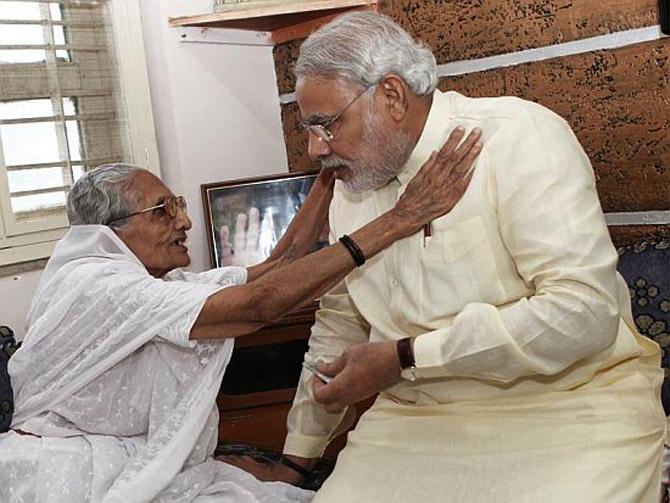
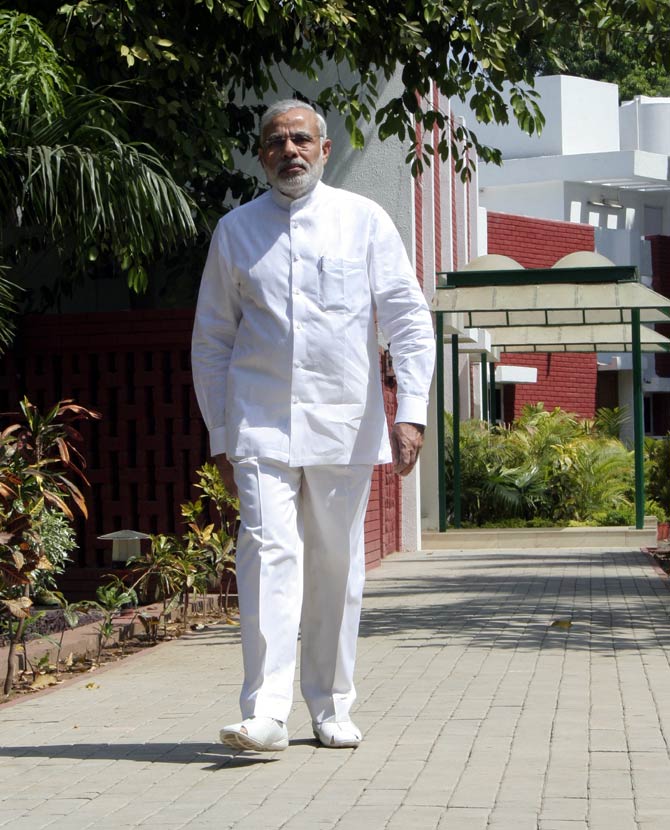
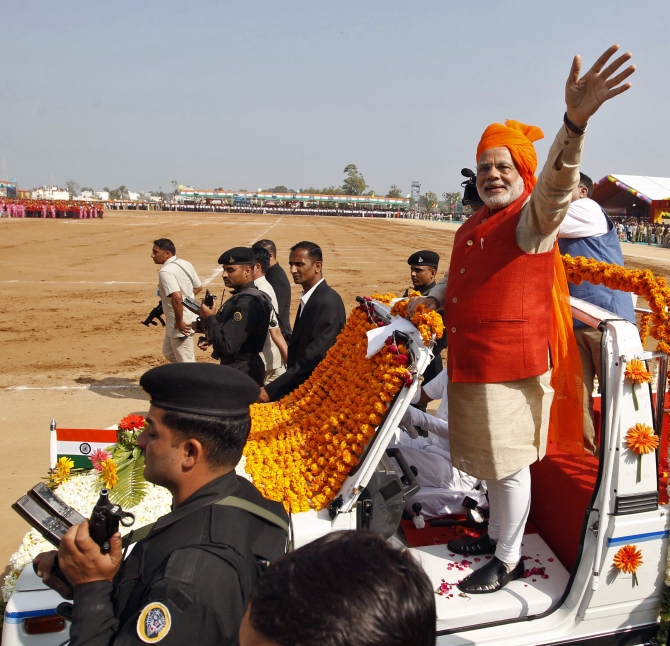
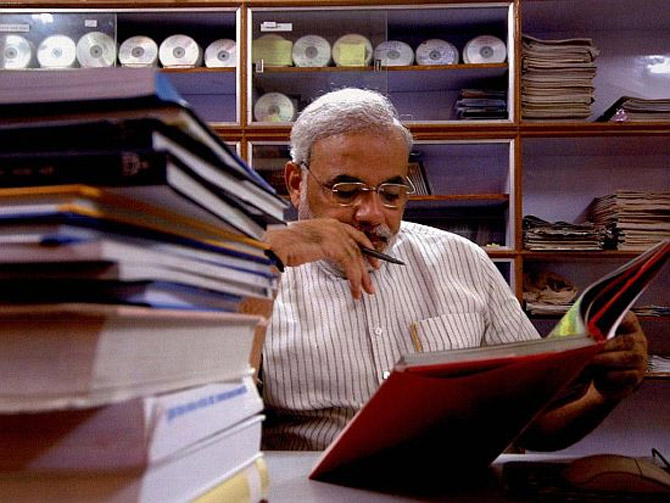
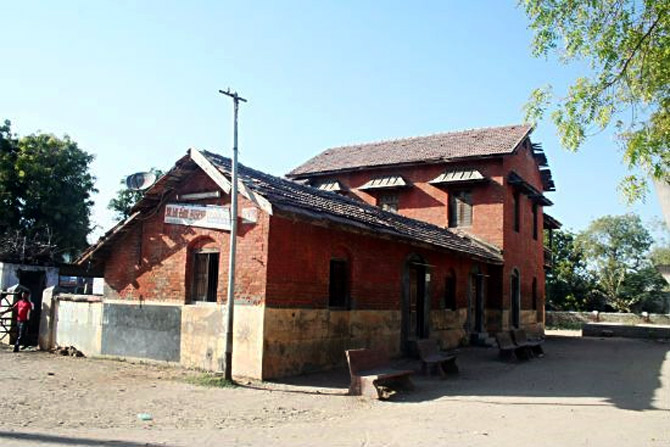
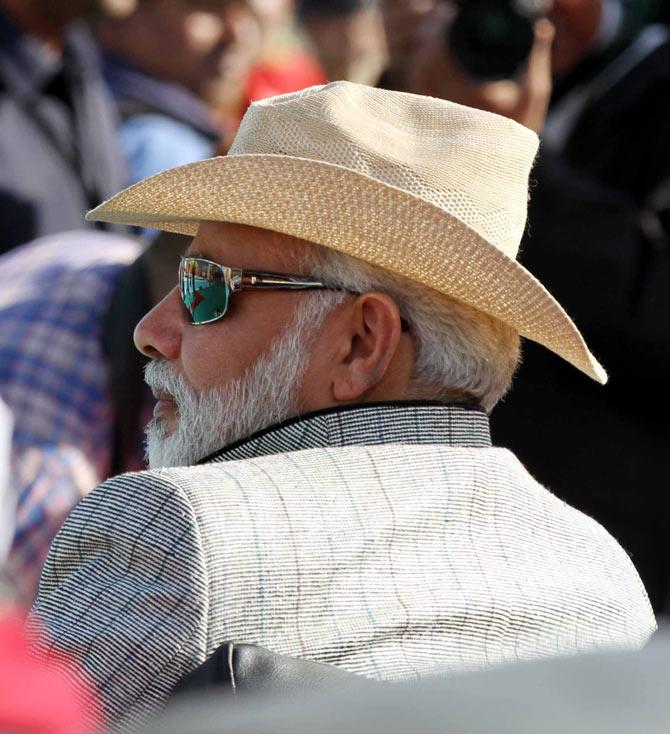
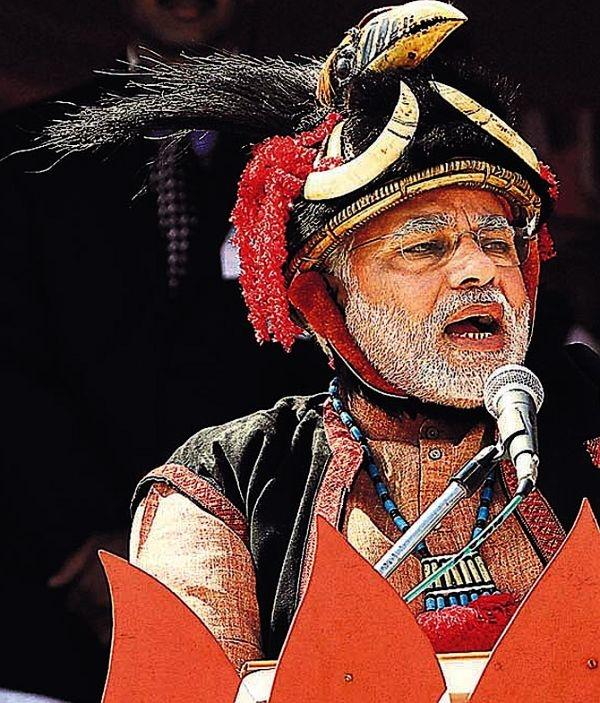
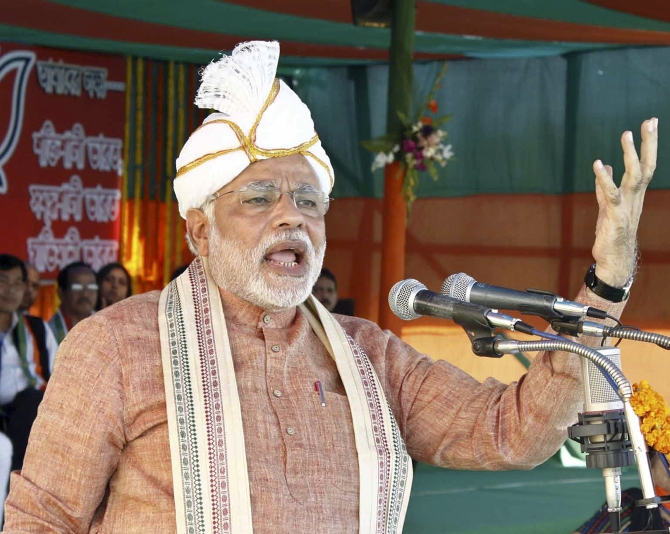
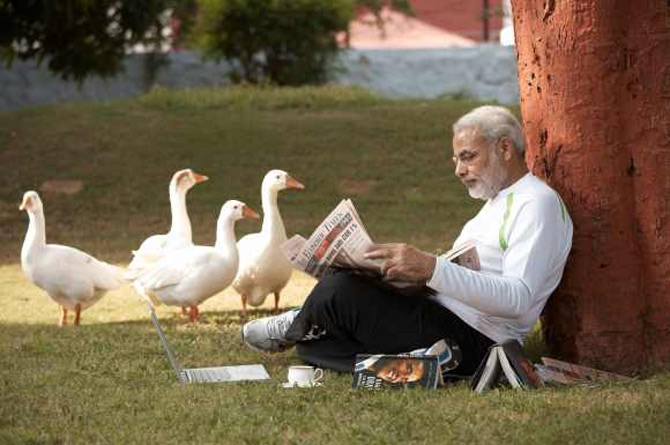
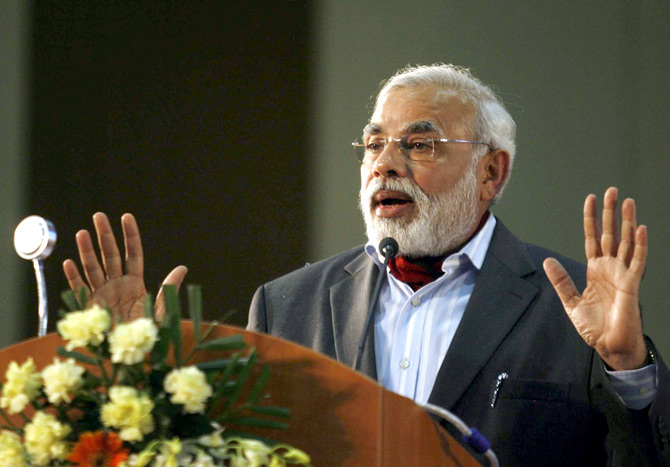
So who really is Narendra Modi? Do we really know him?
Sheela Bhatt/Rediff.com's ready reckoner on the mystery man who is likely India's next prime minister.
1. Vadnagar, an ancient town that is almost 2,500 years old, is Narendra Damodardas Mulchand Modi's birthplace. Indians strongly identify themselves with their janambhoomi, and Modi is no different.
He likes the Hatkeswar Mahadeo temple, built in the 15th century, in his home town. His birthplace is unique in that it saw both Hinduism and Buddhism flourish. It is also a highly cultured town that is famous for the singer-duo Tana and Riri who stumped none other than the legendary Tansen in the Mughal king Akbar's durbar.
Vadnagar was once the capital of Gujarat and has a proud place in history also because the Chinese scholar Huan Tsang visited it during his 17-year journey through India in the 7th century and has narrated Vadnagar in detail in his fascinating memoirs.
2. Modi was born on September 17, 1950. He makes it a point to take the blessings of his mother Heeraben on his birthday. He bonds reasonably well with his four brothers and sister, but doesn't display it in public. His wife's name is Jashoda, and the couple separated soon after marriage.
3. His most striking personal habit is to wear well-ironed and wrinkle-free clothes, a habit he retains from his teenage years when he would fill hot water in a brass lota and iron his shirt using the vessel's heated bottom.
He continues to lay stress on dressing well and, judging by his public appearances over the last couple of years he owns hundreds of kurtas, all of them tailored by his favourite darzi in a posh shop on Ahmedabad's CG Road. Everyone knows that he is crazy about wrist watches and sandals.
4. Modi is fastidious about cleanliness. He keeps his desk, his home and general surroundings spic and span. There is no doubt that he is very comfort-oriented in the matter of designing his home and personal desk. He loves his chartered flights too -- one of the privileges of being a chief minister.
5. He can be dubbed one of the best copywriters in contemporary India. No Indian advertising agency is likely to match his ability to paraphrase ideas, launch new brands, re-launch people and events, write-rewrite copies to sell ideas or products as he does.
6. In closed-door meetings he likes multi-media presentations. He has a flair for technology and has a child-like enthusiasm for it. In meetings he has displayed that he has a fine sense of humour -- though it can sometimes be hurtful.
7. He is extremely prudent in money matters, and would like to pay the least and get the most while finalising contracts of various ministries. He can be called economical, if not a miser. Yes, he is very economical with his own money as well.
8. He has back pain at times, with the upper part of the spinal region being the problem area. When he stands for a long time his feet get swollen. But, no, he doesn't have any serious health problems.
9. He has spent enough time in the Rashtriya Swayamsevak Sangh, so his language, nuances of behaviour and expressions can never be Westernised. He definitely likes Western watches, accessories and homely comforts, but that's all.
He is quite conservative, even old-fashioned, on issues relating to women and family, though he will never say so in public.
His knowledge of English is reasonably okay, but he is not comfortable speaking it. He has done his master's in political science, but as an RSS pracharak he learnt all about India, Hinduism and family life when he was staying with RSS families.
10. Those who believe in astrology may like to know that Modi's moon sign is Scorpio, and sun sign is Virgo. His star constellation is Anuradha. He was born at 11 am on September 17, 1950. An astrologer who saw his kundli says his rahu antardasha , considered good for those in politics, will be on till September 2014.
Ahmedabad's best astrologer claims Modi's planetary strength lies in Tula, no mangal in chalit and Rahu in the sixth house. Those in the know say that Lokmanya Bal Gangadhar Tilak and Otto von Bismark had similar kundlis. According to the current astrological transit, Saturn and Rahu in Tula and Jupiter's position in his kundli are helping his rise.
The man's rise is impressive when one considers that for almost three decades he lived with little money. When in his 20s, he arranged and acted in a play in Vadnagar to collect funds to build his school's boundary wall. He has even served tea in his maternal uncle's canteen at the bus stand in Ahmedabad while studying in college.
11. He fasts all nine days during Navratra every year -- eating only one fruit a day during this time. He eschews the Navratra-special thali meal which is traditionally allowed once a day.
He fasts out of devotion for Goddess Ambaji, and has changed the landscape of her shrine on the Gujarat-Rajasthan border.
Out of reverence to Ma Amba he has built a Rs 700 million-plus Shaktipeeth parikrama on the Gabbar hillock, considered highly sacred by devotees.
12. He logs on to the Internet every morning without fail and checks all that is written about him. Even if he is travelling, he gets newspapers and cuttings of what his critics are saying about him.
13. He is the decision-maker. Period. He will not send any decision to a Group of Ministers.
14. Modi has no 'best friend'. He is a loner.
15. Modi is married, but never lived with his wife. For long he has trusted Anandiben Patel, a minister and among his likely successors if he shifts to Delhi. He guards his privacy zealously.
16. Modi is a workaholic. After going online at 7 amor even earlier, he would call his party men from all over Gujarat; now, he calls people from all over India.
He attends office early in the morning, and works till10 pm if need be. He is a leader who is not going to ease his grip on party politics even if he were to head a ministry or be ensconced in the PMO if the National Democratic Alliance government comes to power.
17. Oh yes, he is in love with the mirror. He poses like a model. He is very conscious of pictures that are sent out from his office.
A few years ago he used to like dark colours, but now he experiments. He keeps a comb handy in his pocket all the time. He keeps half a dozen colourful khes angvastras ready in his car, and chooses one according to the crowd he is addressing.
18. He sleeps for only five hours -- sometimes even less. Whatever time he hits the bed, he gets up at 5 or5.30 am.
19. He writes poems, though their literary value is debatable.
20. His icon is Swami Vivekananda. He admires Indira Gandhi.
21. Modi was incommunicado when he was 17 and 18. He left his family and went to Rajkot's Ramakrishna mission and to the Belur Math in West Bengal and then to the Himalayas. He wanted to do something, but did not know what. So he travelled and wandered around India.
22. His favourite food is bhakhri (crispy rotis) andkhichdi made in Gujarati style. Modi knows to cook.
23. He taught Gujarati to Sadhvi Ritambhara when he was a full-time worker in the Vishwa HinduParishad. The sadhvi's guru Swami Parmanand was fond of Modi's spiritual quest.
24. Modi meets local Gujarati Muslims frequently. But the easy access given to them is among Gandhinagar's well-kept secrets.
25. He is a hard task-master and treats government officers as tools to achieve his political goals.
26. There is no doubt that he played communal politics in the last three Gujarat elections. But his close associates say, in a weak defence, that his negative side is not dominated by his penchant for identity politics.
He is like most national leaders -- from Indira Gandhi to Nitish Kumar -- opportunistic, which drives him to play identity politics for the sake of power.
27. He has won so far because he knows the usefulness and uselessness of everyone around him. Two, he recognises time and its value. He strikes when it's his time and bends otherwise.
28. No one should have any doubt that if at all he fulfills his dream of becoming prime minister he will turn New Delhi topsy-turvy. He will make bureaucrats work and will be a dictator who will ensure the implementation of his decisions.
His Jyotigram Yojna to provide power to all Gujarati households 24x7 was almost impossible to implement, with the toughest resistance coming from users of electricity.
But Modi put his foot down, plugged leakages, stopped theft, and forced farmers to pay pending bills running into billions of rupees. It was a very China-like implementation that he managed through Saurabh Patel, the state energy minister.
Modi's entire image is built on and around this achievement after the 2002 riots.
29. Whatever critics may say, Modi has learnt his lesson after the 2002 riots. Secular activists, the media and the judiciary struggled to get Modi's government to follow the rule of law. That has made a difference, and is a huge achievement for Teesta Setalvad and other activists.
The Modi camp says he is unlikely to repeat the mistakes of 2002. However, those who hate him will continue to hate him. Modi evokes extreme emotions in his fans, and more so in his opponents.
30. Modi will leave his imprint on the way the central government handles the nation's minorities.
Modi has an original way of political manoeuvring. Just wait and watch.
His marriage
A political storm has erupted over Narendra Modi's too-late-in-the-day public acceptance that he is married to Jashodaben.
While he had never denied his marriage, he had always hidden it or maintained a stoic silence over it.
The Congress's Digvijaya Singh and the party's pan-India machinery, women activists ranged against Modi, and all his staunch opponents have attacked Modi over this.
This round, it seems, will go to Modi.
"The self-confessed strong man doesn't deserve any sympathy for inviting attacks, personal or political, but the facts of Modi's child marriage is more of a tragedy than a scandal that his critics are portraying," says Vikram Vakil, a Surat-based senior journalist who first scooped Modi's marriage way back in 1993 for the Gujarati political weeklyAbhiyaan I had founded.
Here is a defence of Modi that an apolitical friend, based in Ahmedabad, offered to Rediff.com after the controversy erupted. He refused to be named in this column, and says he came to know about the marriage in 2003.
"By liberal standards, all individuals are free to have their own choice of partner. The family, parents or society can't impose their choice on a teenage son or daughter as it happened in the Modi-Jashodaben case," this friend of Modi says.
"If 17-year-old Modi wanted to get out of the marriage, which was imposed on him by a socially backward society and his family, it's not only ethical but his right to walk out of the forced marriage. Feminists are against the obnoxious old idea of pativrata nari. In hitting out at Modi, they will be wary of endorsing Jashodaben's stand too," argues Modi's friend from Ahmedabad.
Vakil, otherwise a staunch critic of Modi, defends him on this count. "Modi's marriage was an accident of destiny. It was a kind of a Shakespearean tragedy where neither the man nor woman can be blamed. Both can be judged as right or wrong. It depends on what is your premise to judge him and her. The external factor worked against them when their lives were not in their hands."
Vakil, in 1993, secured the first interview with Jashodaben.
"Then, she had expressed her one-way devotion to Modi and even her stubborn and highly orthodox streak," remembers Vakil.
She told Vakil that she would not agree to a divorce. In the early 1990s, she said, when she heard on the radio that Modi had been sacked as the BJP's general secretary, she went on a fast and consumed only water for six days to pray for him.
Once she even got to see Modi for a few seconds, says Vakil. "She had gone to Maninagar in Ahmedabad, when she saw Modi going by on a two-wheeler. She immediately left his path so as to not embarrass him."
Those who know Modi in Gujarat, says Vakil, have argued for many years that he never maintained any relations with his wife, with whom he did not have a conventional married life.
Jashodaben has also confessed that she never had any relations with her husband. "So what's the fuss all about?" asks Vakil.
When the story revealing Modi's marital status was published in 1993, Vakil recalls he received flak from the Rashtriya Swayamsevak Sangh and Vishwa Hindu Parishad leaders based in Gujarat. The RSS has known of Modi's martial status all along, Vakil insists.
Modi never had any loving relationship with his wife. It was not a case of him 'abandoning' a marriage, which did not exist in real life. Modi, on his part, never confined Jashodaben to the marriage, says his friend of many decades in Ahmedabad.
Jashodaben, a highly conservative woman who understandably, by the social standards of India of the 1960s, opted to remain confined to the marriage instead of kicking Modi out from her life for not starting the marriage in the real sense.
She could have got a divorce and married again, at a later stage, when Indian society was changing and urbanisation had impacted social values. In spite of media pressure, if she does not speak against Modi, it suggests that Modi has not ill-treated her or exploited her after parting ways, says Modi's Gujarati friend.
"Any criteria you apply -- orthodox or liberal -- in this particular case, Modi will win the round only because in matters of love we Indians know ishq par zor nahi (love brooks no pressure)," he says, summing up the predicament of his friend who wants to become prime minister.
"The option of divorce she always had before her, but she wanted to remain devoted to Modi. It was a one way relationship that she opted for. Even when she became economically independent, she preferred to remain alone but married nominally," says Vakil. "I think we should respect Jashodaben for the choice of life she has chosen to live, and we must see reason in Modi's stand."
Anticipating that this issue would create an uproar,Rediff.com had spoken to Kalindi Randeri some time ago, to understand Modi's marriage.
In 2009, M V Kamath and Kalindi Randeri co-authored a book titled Narendra Modi: The Architect of a Modern State when Modi was struggling to get rid of the stigma of the 2002 anti-Muslim riots on his watch.
As Modi has taken centre-stage in national politics, the book was repackaged with a new title and a revised version was published as The Man of the Moment: Narendra Modi.
Kamath and Randeri had been sympathetic to Modi much before writing the book. In a rare event, Modi had initially agreed to cooperate with the authors. Later, he distanced himself from the book without giving any reason.
Kamath, the former editor of The Illustrated Weekly of India, once Asia's oldest English magazine, and a well-respected commentator, is known for his saffron views.
Randeri, who started her career as a social worker in a nursery school, reached the top as the founder of educational institutions, including the SNDT Women's University which opened new horizons for polytechnic education for women in India. Currently, the Mumbai-based Randeri runs a Web site, Ultimate Indian Names.
Those who have read the book found it largely one-sided and too defensive of Modi's actions during the 2002 riots.
In the first part of an exclusive interview with Rediff.com, Dr Randeri explains the personal side of Modi.
- While writing the book, did you talk to Modi about his marriage?
Modi is a very frank person. He didn't even try to dodge it. He wanted us to write about it in our book. When we asked him about his marriage, he said, with a smile, "It's better you talk about this to my elder brother, Sombhai."
So, we talked to Sombhai about it. He was also very frank and gave us the details that we wanted. In fact, I asked him, 'Do you have his kundali (astrological chart)?' He said he did not have it. I then got from him Modi's time of birth and birthplace.
The whole family was very frank. His mother also talks very frankly about the marriage.
Did Modi and Jashodaben ever lead a normal life?
Never. Never. This is how exactly it happened.
They got married one night. The family came back home with Modi. The baraat (bridegroom's party) had gone in a bullock cart, and everybody came back. The girl remained with her parents. They were young, the girl was younger than Modi. Modi was hardly 17 years old.
Modi has never seen her after that day. He left Vadnagar soon after the marriage. He had never shown any interest in the marriage, the relationship reached a dead end.
Somewhere I had read that the woman (Jashodaben) said she has not seen him for years. But she has decided not to marry again and this is her wish. And she doesn't expect anything from him.
Is Modi close to his family?
There is no discordant note within, but he is not close to them only because he left his family at the age of 17, 18. After that, he never ever got involved with them, nor met them socially unless they met accidentally.
In fact, the other day, I heard him say on TV that since 35 years he had not met any of his family members so he decided to meet them.
What we like is -- and we must give credit to his family also -- that they have never tried to impose themselves on him. That's called sanskar (culture).
Okay, you might be a big man, but that doesn't mean we have to follow you or even flaunt our connection.
This is something you observe when you meet his mother. She is transparent and she is so sure of the values that she has given him.
She told us that after he became chief minister he came to her for charansparsh (touch her feet) to seek her blessings. Mother Heeraben told him only one thing: 'I have to tell you, never take bribes.'
When we asked her, 'Don't you want to go and stay with him in the chief minister's bungalow?' She said, 'Me? Why should I go? I'll go mad.' She said, 'Mad'. She only speaks Gujarati. She said, 'What am I going to do there? He will be busy all day.'
When I asked Narendrabhai -- it was really audacious on my part -- 'Can I see your bedroom?' He said okay. He directed me inside his house. There was nothing in his bedroom, except pictures and idols of Saraswati, Vivekananda and Shiva and just one bed.http://www.rediff.com/news/slide-show/slide-show-1-ls-election-30-things-you-should-know-about-narendra-modi/20130913.htm